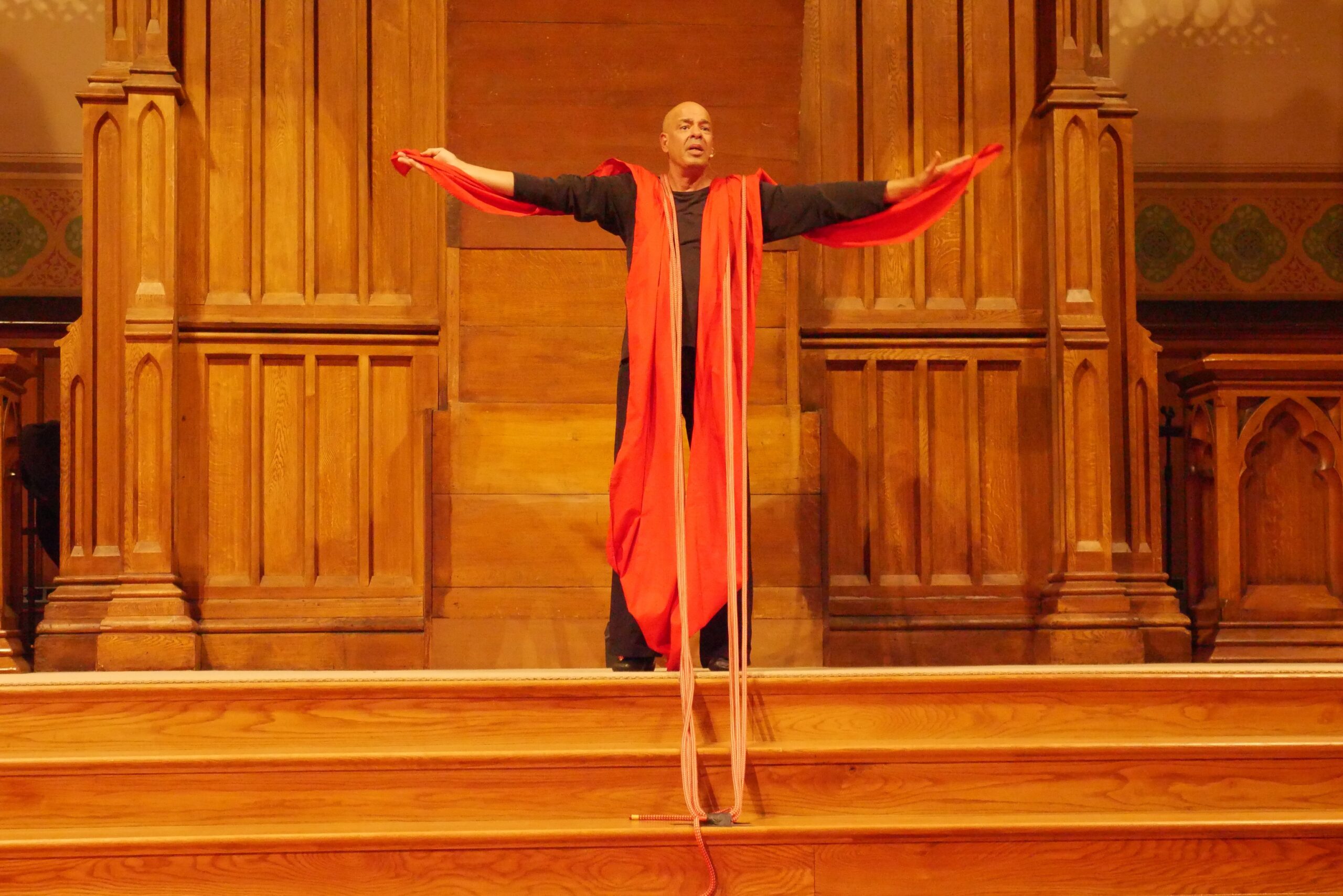First Parish Church of Brunswick brings Antonio Rocha for one-man Malaga show
October 18, 2024
 Abigail Hebert
Abigail HebertLast Friday, the First Parish Church of Brunswick hosted award-winning storyteller Antonio Rocha for a performance of “The Malaga Ship: A Story of Maine and the Middle Passage,” a 45-minute one-man show. In addition, the church hosted a brand-new eight-panel exhibit on “Brunswick in the Slave Trade,” written and designed by the Pejepscot History Center to complement the Malaga performance.
Rocha, wearing all black, presents his performance through two distinct perspectives: that of himself, the storyteller, and that of the Malaga Ship itself, personified through his outstretched arms. Throughout the performance, Rocha the storyteller communicates with Rocha the ship throughout its life, beginning in the pines of Maine and ending in the ship’s sinking off the coast of Sierra Leone.
The Malaga was a slave ship built in Brunswick by Joseph Badger in 1832 that traveled south, eventually making its way to Brazil, where it was sold to the top slave trader in Rio De Janeiro in 1845. At this point in the performance, Rocha the storyteller reminds the audience that slavery was an economic system above all else.
“The madness started with sugar. Just picture this, sugar coming into Africa from Asia … crossed the Mediterranean, entered Europe, and when those kings and queens got a taste of that thing we call sugar?… They got sugar high,” Rocha said. “The Europeans made millions selling and trafficking. Loans, companies, banking, railroads, supplied ports, shipbuilding, tax[ing]—it was an industry like no other in the 1800s.”
Later in the performance, Rocha expanded on the personal impact of the history of enslaved people. Rocha explains the brutality of slavery in Brazil, trauma that his African ancestors that came from Gabon to Brazil likely faced hundreds of years ago. In one portion of the performance, Rocha describes the case of the “Tiger Slaves” and the dehumanization that they suffered in Rio’s economy.
“The Tiger Slaves were not [called this name] because of how strong they were. It was because of the stripes they [had] on their backs,” Rocha said. “They worked the graveyard shift, taking barrels of feces down to the bayside and the ocean side, dumping their master’s feces, barrels filled with it, and the feces would run down the side of them, week after week, month after month, year after year.”
Finally, Rocha returned to his performance as the ship itself, exploring the brutality of slave ships by describing the packed conditions on board.
After a stirring performance, Rocha took questions from an audience of churchgoers and community members. During this time, Rocha explained how he started his research on the Malaga ship in 2020 after meeting Daniel Minter from Indigo Arts Alliance.
“[When I moved to the United States] … I wasn’t looking for Malaga,” Rocha said. “It was Daniel Minter from Indigo Arts Alliance. [Minter was] like, ‘Have you heard of all these ships? One of them went to Brazil.’”
Rocha said preparing for the performance did not involve a script. Rather, it simply involved blocking out each scene as if it was a dance routine, moving sticky notes around. This method of choreography came out of his training as a mime.
Before and after the performance, Rocha emphasized that the point of the performance was not to lay blame on anyone but rather to expose the brutality of the practice as a means of moving forward.
“It doesn’t matter who we are, we all have ancestral trauma. No matter what group you’re from,” Rocha said. “If you are a person who caused the harm, if your family is related to a slave owner or somebody who whipped them, that is very traumatic for you to be a human being that is capable of doing that.… So do look at your stories. It’s a great healing antidote.”
Accompanying the performance was an exhibit illustrated with maps, portraits, photography and documents that tell the authentic story of Brunswick’s involvement in the slave trade from the arrival of the colonizers through the growth of abolition.
The exhibit explains how Joseph Bager, a parishioner in First Parish, built the Malaga, even though the church would go on to host prominent abolitionist figures like Harriet Beacher Stowe and later civil rights figures including Martin Luther King Jr. According to Susan Beegel, a member of the Adult Christian Education Committee that organized the performance, this event came about due to the research and initiative of Bob Beaumont, also on the Education Committee, who was inspired to host Rocha at First Parish after learning the history of the Malaga Ship.
Ultimately, Rocha said that the process of preparing for and executing the performance was a deeply emotional, personal and healing journey.
“Malaga is a very sad story, but I’m so happy I found her,” Rocha said. “We are tight friends now. We sail often. She [taught] me a lot, and in a wonderful way, she took me back to Africa.”

Comments
Before submitting a comment, please review our comment policy. Some key points from the policy: